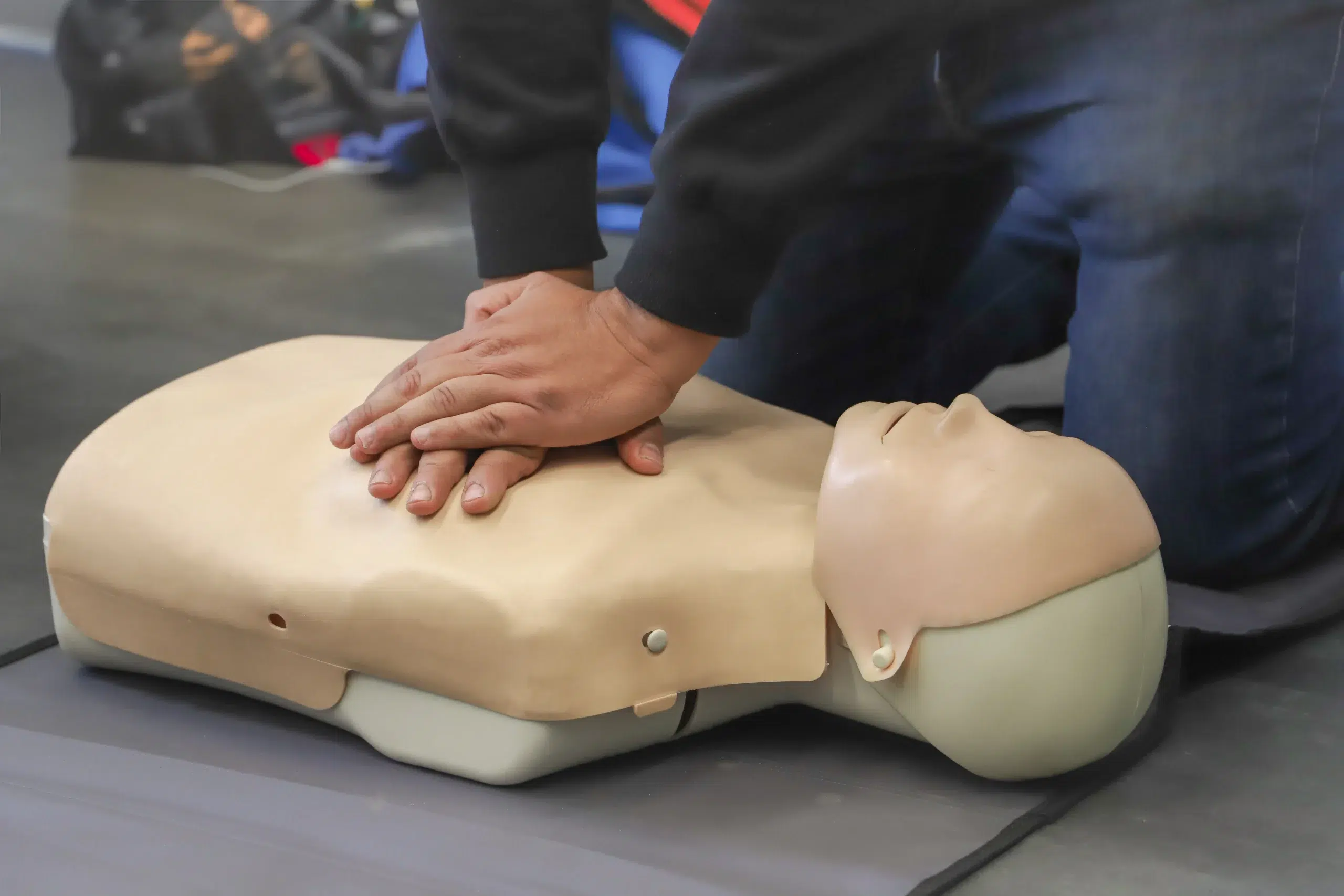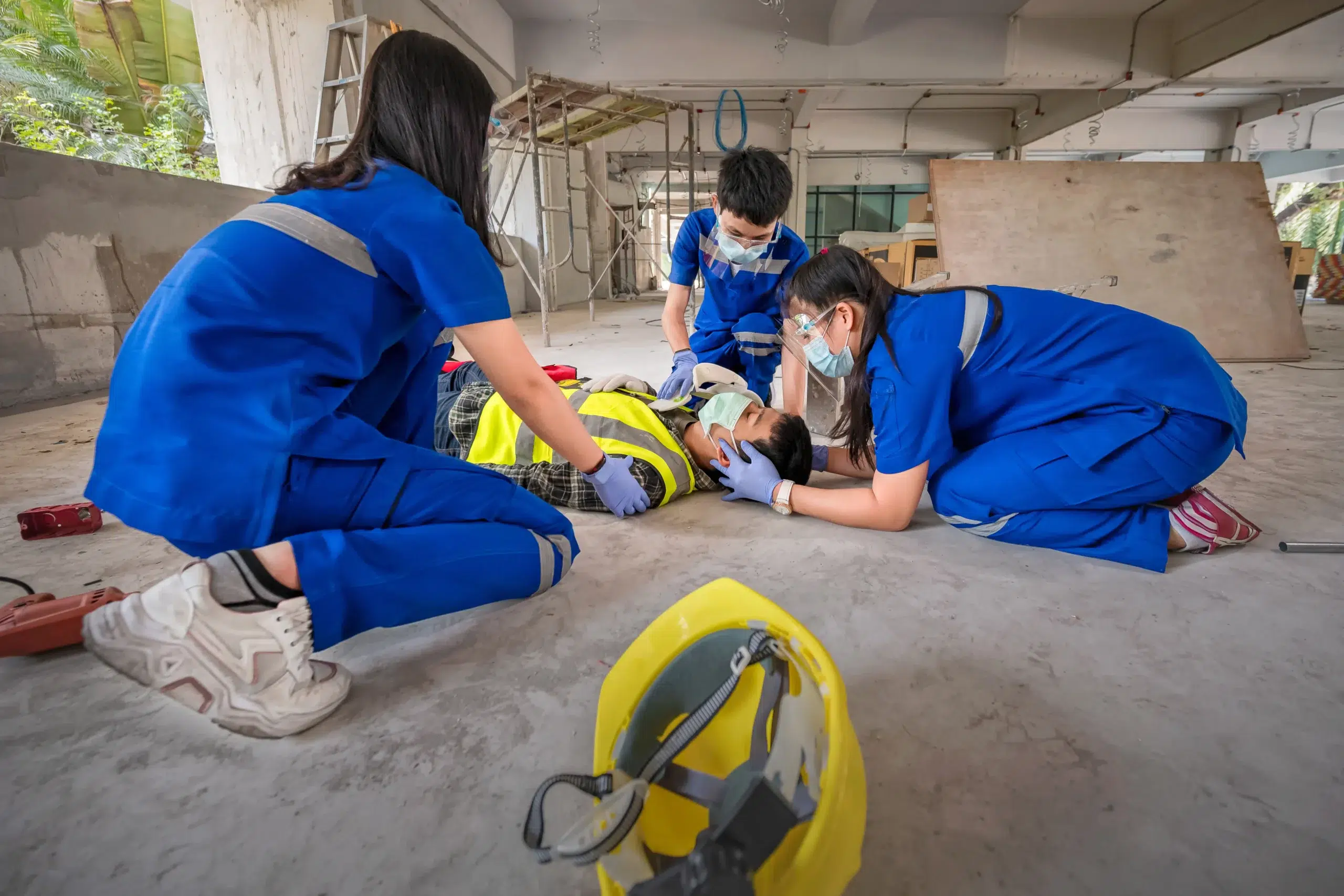In a medical emergency, every second counts. Being equipped with up-to-date CPR skills can make all the difference. But how long does CPR certification last, and how can you ensure you’re always prepared to help? This comprehensive guide will walk you through the ins and outs of CPR certification, including its importance, the different types available (such as BLS, ACLS, and PALS), and how long each one remains valid. We’ll also cover the renewal process, the potential consequences of letting your certification expire, and tips for maintaining your CPR proficiency. Whether you’re a healthcare professional, a concerned parent, or simply someone who wants to be prepared for anything, this guide will provide you with the essential information you need.
Key Takeaways
- CPR certification empowers you to act in emergencies: It signifies your readiness to provide crucial assistance when someone’s breathing or heartbeat stops. Regularly renewing your certification keeps your skills and knowledge current.
- Various CPR programs meet different needs: From basic CPR for the general public to specialized certifications like ACLS and PALS for healthcare providers, choose the program that aligns with your goals.
- Maintaining CPR proficiency requires ongoing effort: Consistent practice and awareness of the latest guidelines are essential for confident and effective emergency response. Make staying up-to-date a habit.
What is CPR Certification?
CPR certification means you’ve completed a recognized course and demonstrated the skills to perform cardiopulmonary resuscitation. It shows you’re equipped to help in a medical emergency where someone’s breathing or heartbeat has stopped. This training covers essential life-saving techniques, including chest compressions, rescue breaths, and recognizing the signs of cardiac arrest. A valid CPR certification demonstrates you’re prepared to respond effectively and potentially save a life. Many workplaces and organizations require CPR certification, especially those in healthcare, education, and childcare.
What does it mean to be CPR certified?
Being CPR certified means you’ve successfully completed a training program and passed a skills test with a recognized organization like the American Heart Association or the Red Cross. These certifications are typically valid for two years. Your certification confirms you understand the core principles of CPR and can perform it correctly. It also indicates you know how to recognize when CPR is needed and respond appropriately in an emergency. This includes assessing the scene, checking for responsiveness and breathing, and calling 911.
Why is CPR certification important?
CPR certification is vital because it equips you with the skills and knowledge to respond effectively during life-threatening emergencies. Studies show that CPR skills decline within months of initial training. Regular CPR recertification is essential for maintaining these life-saving skills, as medical knowledge and CPR techniques change over time. Having a current CPR certification gives you the confidence to make a difference if someone experiences cardiac arrest.
How Long is CPR Certification Valid?
Knowing the validity of your CPR certification is crucial for ensuring you’re prepared for emergencies. Let’s break down how long certifications typically last and what can influence their duration.
Standard Certification Length
CPR certifications are typically valid for two years. This standard timeframe applies to most recognized certifications, including those from the American Heart Association (AHA) and the Red Cross. This two-year period reflects the understanding that skills and knowledge can fade over time. Staying current with the latest guidelines and techniques is essential for providing effective CPR should you need to use it. For more information on renewing your certification, check out the Red Cross website.
Factors Impacting Validity
While the standard validity is two years, several factors influence how long your CPR skills remain sharp. Medical knowledge and CPR techniques are constantly evolving. Regular practice is ideal, but let’s be honest, it can be tough to maintain. Studies show that CPR skills can decline within months of training, with less than half of participants passing a skills test after just one year. This highlights why refresher courses and staying informed about updates to CPR guidelines are so important. Save A Life CPR offers resources for checking your certification status.
CPR Certification Types and Durations
Different CPR certifications cater to various professional needs and levels of expertise. Here’s a breakdown of some common types and how long they’re valid:
BLS Certification
Basic Life Support (BLS) certification equips healthcare professionals, and anyone else who needs it, with the skills to perform CPR and other essential cardiovascular life support techniques. A BLS certification is valid for two years. Renewal is required after this period. Most people complete a combination of online modules and an in-person skills session with an instructor, which typically takes about four hours for blended courses (those that combine online and in-person components). You can find more information on our BLS Certification courses.
ACLS Certification
Advanced Cardiovascular Life Support (ACLS) certification focuses on healthcare providers who respond to cardiovascular emergencies. Like BLS, ACLS certification is valid for two years. This training covers advanced methods for managing cardiac arrest and other cardiovascular emergencies. Participants must demonstrate their skills in a hands-on session. Check out our website for more information on our CPR and First-Aid courses.
PALS Certification
Pediatric Advanced Life Support (PALS) certification is designed for healthcare providers who work with critically ill infants and children. PALS certification, similar to BLS and ACLS, is valid for two years. The course teaches how to assess and treat pediatric emergencies, including respiratory and cardiac arrest. It requires both theoretical knowledge and practical skills demonstrations.
Renewing Your CPR Certification
CPR certification isn’t a one-time achievement; it requires regular renewal to keep your skills sharp. Knowing when and how to renew is key to maintaining your qualifications and responding effectively in emergencies.
When should I renew?
CPR certifications typically remain valid for two years. Keep track of your expiration date so you’re always ready to help when needed. Don’t let your skills expire—staying current can make all the difference in a critical situation. Set reminders to avoid gaps in your certification.
How do I renew?
Renewing your certification usually involves a refresher course. Organizations like the Red Cross and the American Heart Association offer recertification courses to refresh your knowledge and skills. These courses cover the latest guidelines and techniques, ensuring you’re equipped with the most current information. Check with your employer or certifying organization for specific renewal requirements. Safety Training Seminars offers various renewal courses to suit your schedule.
Online vs. In-Person Renewal
You have options for renewing your CPR certification. Online renewal courses offer flexibility, allowing you to learn at your own pace. However, in-person renewal is often required for workplace certification or to meet regulatory requirements. In-person courses provide hands-on practice and direct feedback from instructors, which builds confidence and competence. Blended learning, combining online learning with in-person skills sessions, is also available and may satisfy certain requirements. Consider your needs and workplace requirements when choosing a renewal method. The Red Cross offers more information on CPR renewal options.
What Happens if My Certification Expires?
Letting your CPR certification lapse isn’t just a paperwork issue—it has real-world consequences for your career, legal standing, and, most importantly, your ability to help in a crisis. Let’s look at what can happen if your certification expires.
Professional Consequences
Many professions, especially in healthcare, require valid CPR certification. If yours expires, you could face repercussions at work, ranging from temporary suspension to job loss, depending on your employer’s policies. Even if it’s not a strict requirement, maintaining a current CPR certification demonstrates your commitment to professional development and patient safety. Don’t let an expired certification hinder your career—stay current to maintain your professional edge. Check with your employer or professional organization about their specific requirements.
Legal Ramifications
Beyond your workplace, there can also be legal implications. While specific regulations vary, some industries mandate CPR certification. Failing to maintain a valid certification could put you and your organization at risk of not complying with workplace safety regulations, potentially leading to fines or other legal action. It’s always best to check the specific legal requirements for your profession and location.
Safety Concerns
Perhaps the most critical consequence of an expired CPR certification is the impact on your ability to respond effectively in an emergency. CPR skills can decline significantly within months of initial training. Regular renewal ensures you’re up-to-date on the latest techniques and guidelines, giving you the confidence and competence to provide assistance when it matters most. Remember, regular practice and renewal are crucial for maintaining proficiency and maximizing your ability to save a life.
Maintaining CPR Proficiency
CPR is a life-saving skill, but like any skill, it requires upkeep. Regular practice and staying informed about the latest guidelines are key to maintaining proficiency and confidence in emergency situations.
Practice Regularly
Consistent practice is crucial for maintaining CPR skills. Think of it like any other skill—the more you use it, the more ingrained it becomes. Studies show that CPR skills can decline within months of initial training, so regular refreshers are essential. Hands-on practice with manikins helps reinforce the proper techniques for chest compressions, rescue breaths, and AED use. Even mentally rehearsing the steps can be beneficial. Consider taking refresher courses or practicing with friends or family to create a comfortable learning environment. This regular reinforcement builds muscle memory and ensures you’re prepared to respond effectively in a real emergency. For resources on CPR renewal and recertification, visit the Red Cross website.
Stay Up-to-Date
The medical field is constantly evolving, and CPR guidelines are no different. Staying current with the latest recommendations from organizations like the American Heart Association (AHA) is crucial for providing the most effective care. These guidelines are updated regularly based on new research and best practices. Recertification is more than just renewing a card; it’s an opportunity to learn potentially life-saving updates. ProTrainings offers insights into key updates to the AHA guidelines, emphasizing the importance of continuous learning. Staying informed ensures you’re equipped to provide the best possible care during an emergency. You can easily check your CPR certification status online to make sure it’s current.
Where Can I Get CPR Certified or Recertified?
Finding the right CPR certification or recertification program depends on your individual needs and location. Here are a few reliable options:
American Heart Association (AHA)
The American Heart Association offers various CPR certification courses that are widely recognized. These certifications are valid for two years, after which you’ll need to renew to stay up-to-date with the latest guidelines. The AHA provides different levels of CPR training, from basic life support for the general public to advanced cardiovascular life support for healthcare providers. You can find AHA-certified training centers on their website.
Safety Training Seminars
Safety Training Seminars offers a range of CPR and First Aid courses in San Jose, California, including options for both initial certification and recertification. They focus on practical skills and knowledge needed for effective emergency response. Check their website for course schedules and availability in your area, including San Jose, Santa Clara, and Sunnyvale. They also offer a convenient RQI program for online recertification. You can find their CPR and First Aid course schedule here, and learn more about their low price guarantee.
Red Cross
The American Red Cross is another well-known organization offering CPR certification and recertification courses. Their programs cover essential CPR skills and are designed to refresh your knowledge and update your certification, which is also valid for two years. The Red Cross has training centers across the country. You can explore their website to find local courses and register.
Local Options
Beyond national organizations, many local providers offer CPR certification courses. These can include community colleges, hospitals, and local health organizations. This can be a convenient way to find certification or recertification in your area. A quick online search can help you discover local training centers and compare programs. Also, check with your workplace or community center, as they may offer CPR training.
Choosing the Right CPR Program
Finding the right CPR program involves considering several key factors to ensure you receive high-quality training that meets your specific needs. Here’s a breakdown of what to look for:
Accreditation
First, confirm the program’s accreditation. Organizations like the American Heart Association (AHA) and the Red Cross offer widely accepted CPR certifications. These certifications are typically valid for two years. Make sure the program aligns with any workplace or personal requirements.
Course Content and Format
CPR programs vary in content and format. Consider what level of training you need. Are you looking for basic CPR or more advanced life support training like ACLS or PALS? Do you prefer in-person, online, or blended learning? While online courses offer convenience, hands-on training is essential for developing practical skills. The Red Cross, for example, offers various formats, including blended learning, which combines online modules with in-person skills sessions. If you need certification for your job, double-check that a fully online course will meet those requirements, as some employers mandate in-person training.
Instructor Qualifications
The quality of instruction significantly impacts your learning experience. Look for programs led by certified instructors with extensive experience. Experienced instructors can provide personalized guidance and feedback, ensuring you master the necessary skills.
Cost and Schedule
Finally, compare program costs and schedules. Prices can vary, so explore options that fit your budget. Also, consider the course schedule and choose a program that accommodates your availability. Safety Training Seminars offers daily certification courses, providing flexibility for busy schedules. We also have a low price guarantee, so you can be confident you’re getting the best value.
Related Articles
- San Jose CPR Classes: Find Certification Near You – San Jose CPR Classes
- Why CPR Is Crucial in Healthcare
- The Importance of CPR in Saving Lives – San Jose CPR Classes
- CPR Certification in San Jose: Your Complete Guide – San Jose CPR Classes
- CPR Renewal in Sunnyvale: Your Complete Guide – San Jose CPR Classes
Frequently Asked Questions
How long does my CPR certification last, and where can I renew it? CPR certifications are generally valid for two years. Renewal involves taking a recertification course, which you can find through organizations like the American Heart Association, the Red Cross, or local providers like Safety Training Seminars. They offer various renewal options, including online, in-person, and blended learning formats.
What’s the difference between CPR, BLS, ACLS, and PALS certifications? CPR is the core skill, while BLS (Basic Life Support) certification builds upon it, adding essential techniques for healthcare providers and others who need it. ACLS (Advanced Cardiovascular Life Support) is for healthcare professionals responding to cardiovascular emergencies, and PALS (Pediatric Advanced Life Support) focuses on the care of critically ill infants and children.
What if my CPR certification expires? Letting your certification expire can have professional consequences, such as job suspension or loss, especially in healthcare roles. It also impacts your ability to respond confidently in emergencies, as skills decline over time. Legally, maintaining a current certification might be mandatory in certain industries.
How can I practice my CPR skills between renewals? Regular practice is key to maintaining proficiency. While refresher courses are beneficial, even practicing the steps mentally or with friends and family using a manikin can help reinforce proper techniques.
What should I look for when choosing a CPR certification program? Look for programs accredited by recognized organizations like the AHA or Red Cross. Consider the course content, format (online, in-person, or blended), instructor qualifications, cost, and schedule to find the best fit for your needs. Safety Training Seminars offers a range of options with a low price guarantee.







